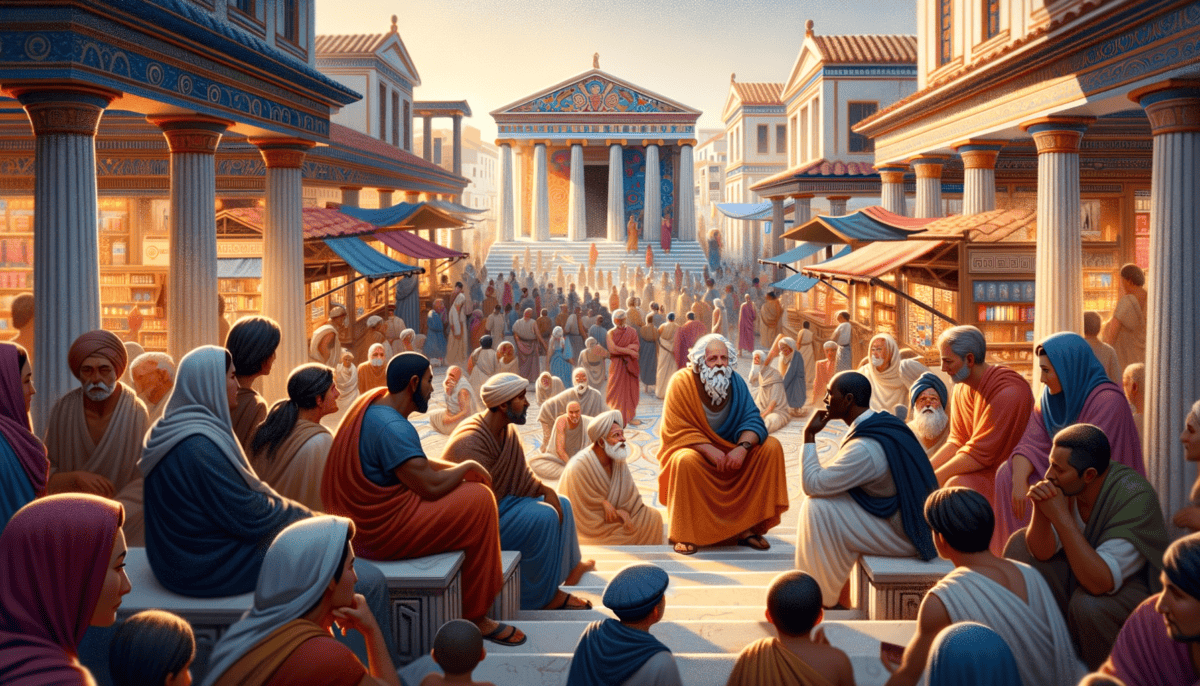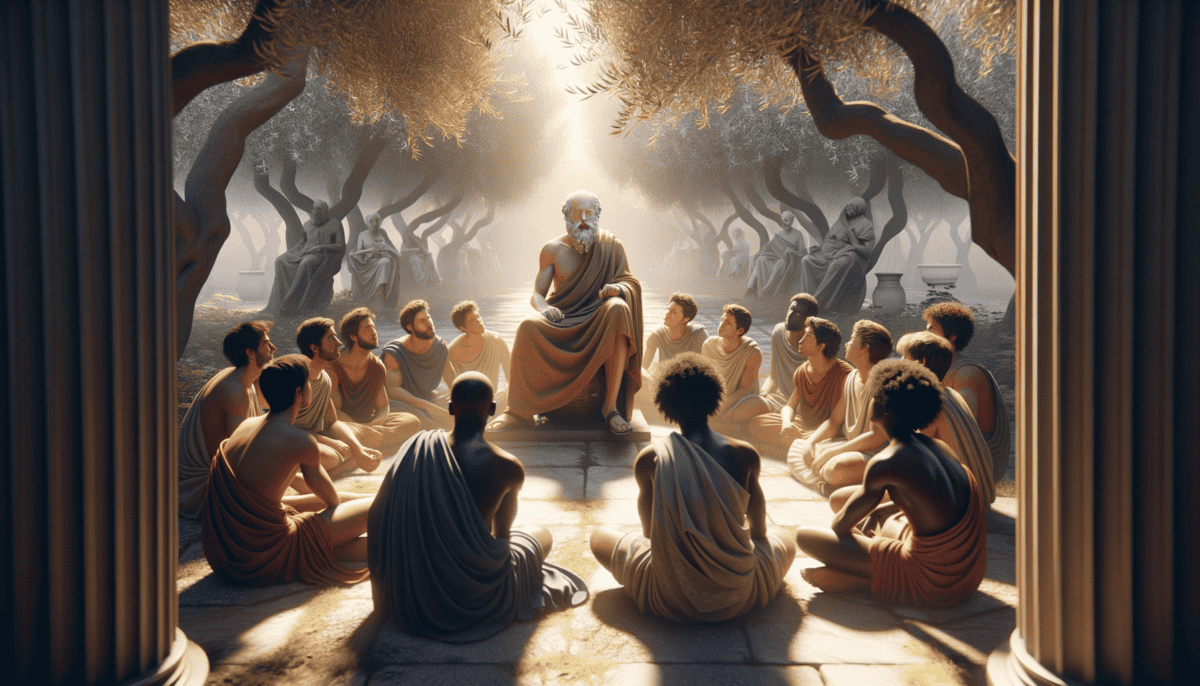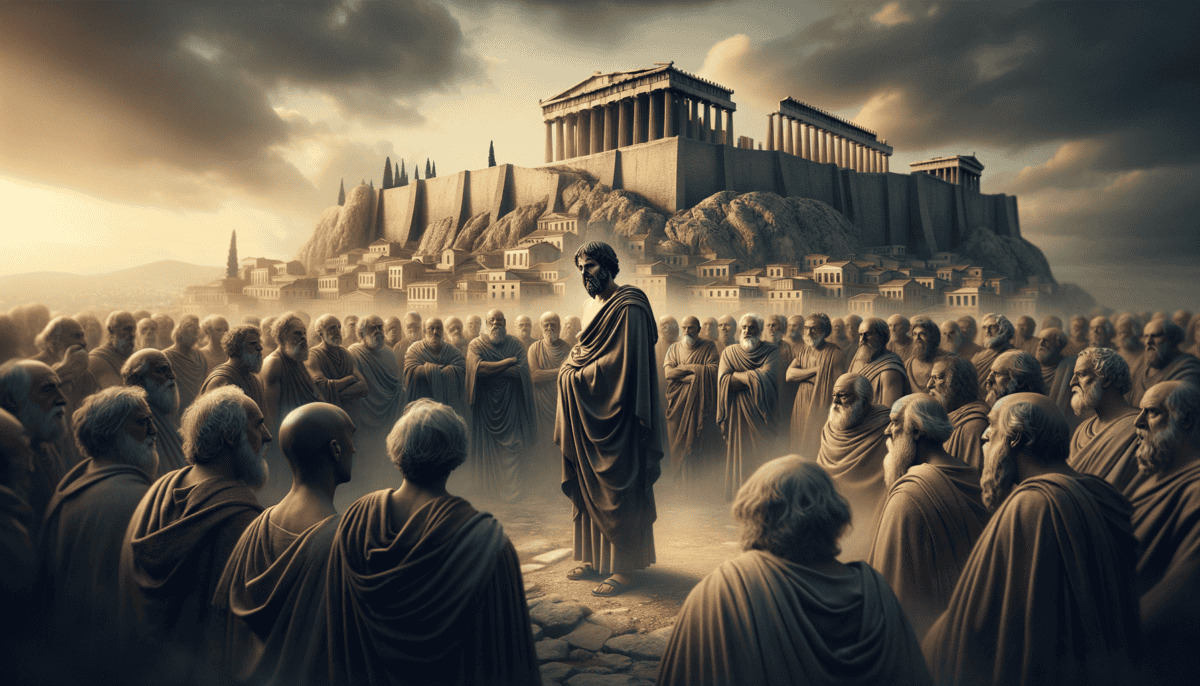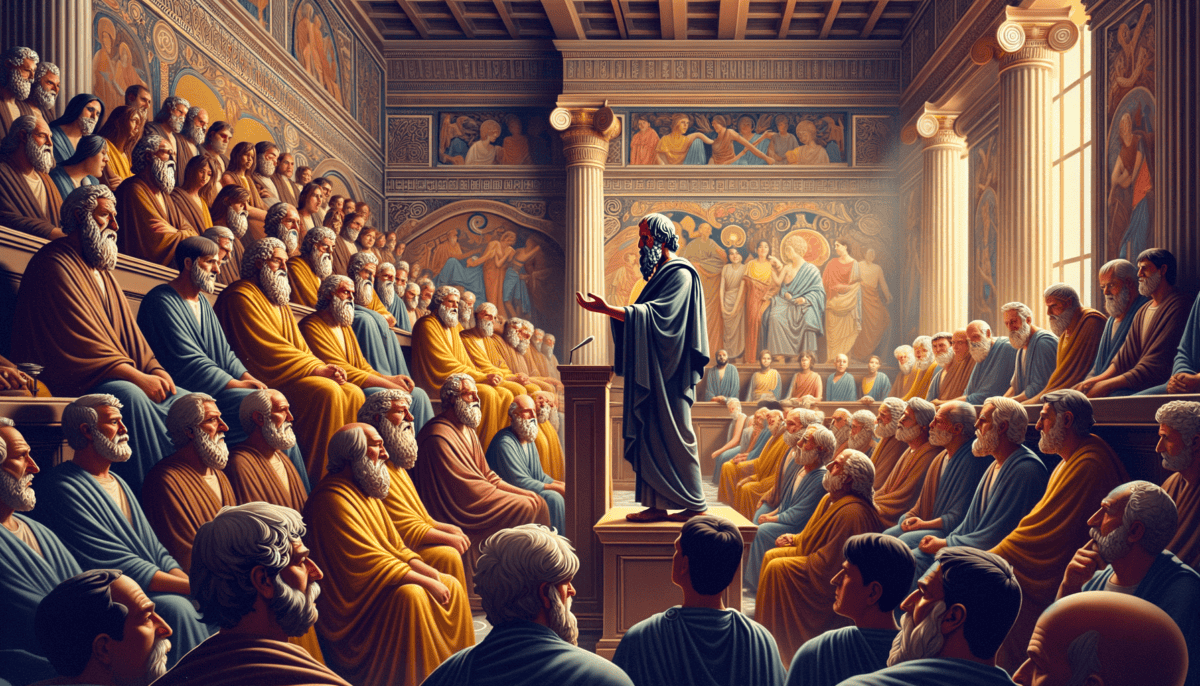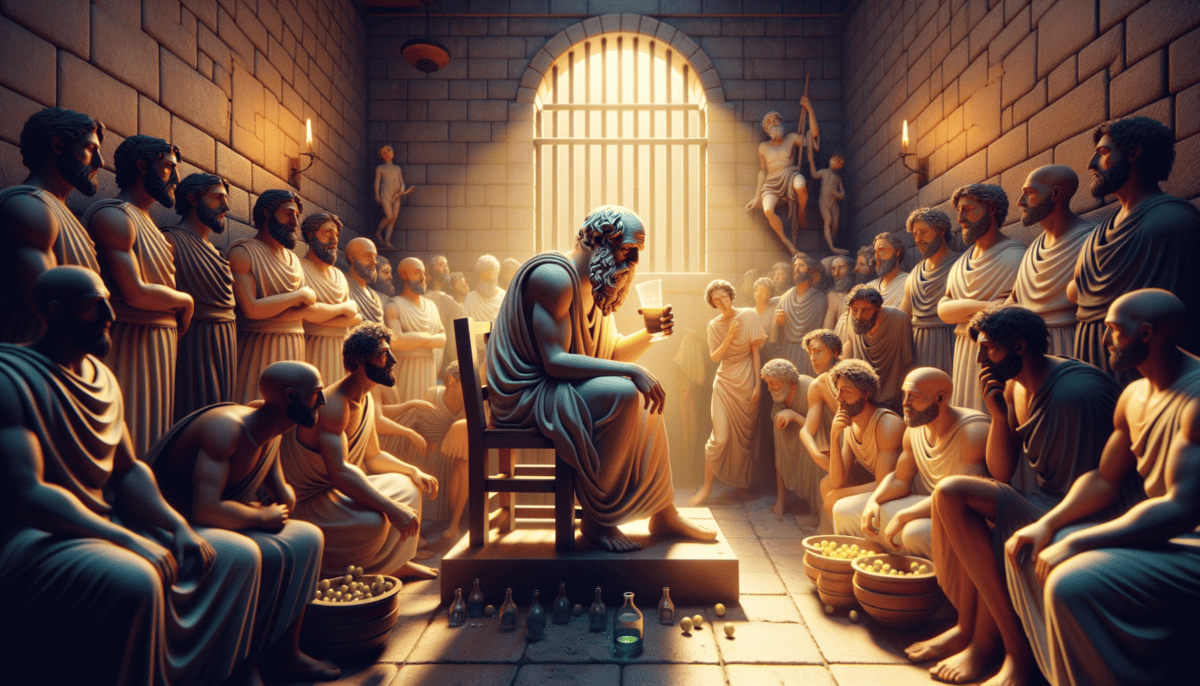A Boy Named Socrates
In the busy streets of Athens, a young boy with curious eyes watched the world go by. His name was Socrates, and he loved to ask questions about everything!
The sun was bright and warm as Socrates walked through the marketplace with his father, Sophroniscus, who was a stoneworker. The air smelled of fresh bread and olive oil, while merchants called out to sell their goods.
"Father," Socrates asked, tugging at his dad's sleeve, "why does the baker make bread round instead of square?"
His father chuckled. "You always ask such interesting questions, my son. That's what makes you special."
Socrates grew up in a simple home with his mom Phaenarete, who was a midwife. She helped bring new babies into the world. When she wasn't working, she told Socrates stories about the babies she helped deliver.
Growing Up Different
While other kids played games and ran around, young Socrates preferred to sit and think. He would watch craftsmen work and ask them:
• How do you know when a pot is perfect?
• Why does the metal bend that way?
• What makes some stones better than others?
Sometimes the grown-ups didn't know how to answer his questions. This made Socrates even more curious!
“The more I learn, the more I realize how much I don’t know,” little Socrates would say.
The First Spark
One day, while visiting the market with his mother, Socrates saw a group of men talking about big ideas. They were philosophers – people who loved thinking about life's biggest questions.
"Mother, what are they talking about?" Socrates asked.
"They're discussing what makes something true or false," she explained.
Socrates' eyes lit up like stars ⭐. He had found his calling! From that day on, he spent more and more time listening to these wise men talk.
Finding His Voice
As Socrates grew older, he started asking deeper questions:
"What makes someone good?"
"How do we know what we know?"
"What is the right way to live?"
Other young people started noticing him. They liked how he made them think about things in new ways. Even though some people thought he was strange, Socrates didn't mind. He knew that asking questions was the best way to learn.
His friend Chaerephon once said, "Socrates, you're the wisest person I know!"
But Socrates just smiled and replied, "The only thing I know for sure is that I know nothing for sure."
A New Way of Learning
Instead of telling people what to think, Socrates helped them find answers by asking questions. When someone said they knew something, he would ask them to explain why they thought that way.
Some people got frustrated with all his questions. But others loved how he helped them think more clearly. Young people especially liked talking with him because he treated their ideas with respect.
The streets of Athens became Socrates' classroom. He didn't need fancy buildings or scrolls to teach. All he needed was his curious mind and people willing to talk with him.
At night, little stars would twinkle above Athens as Socrates walked home, his mind full of new questions for tomorrow. He knew this was just the beginning of his journey to understand the world around him.
Questions in the Marketplace
The morning sun warmed the bustling streets of Athens as Socrates walked through the marketplace. He wasn’t a young boy anymore, but his eyes still sparkled with curiosity.
“Good morning, wise Socrates!” called out a fruit seller. “Would you like some fresh figs today?”
Socrates smiled and asked, “How do you know these figs are good?”
The fruit seller looked confused. “Well… they’re ripe and sweet.”
“But what makes something truly good?” Socrates asked. “Is it just how it tastes?”
A New Way of Talking
This was how Socrates spent his days. He walked through Athens, talking with anyone who would listen. He didn’t tell people what to think. Instead, he asked questions that made them think harder about what they believed.
“The unexamined life is not worth living,” Socrates would often say.
People started calling his way of asking questions the “Socratic Method.” Here’s how it worked:
• First, someone would say they knew something for sure
• Then Socrates would ask them questions about it
• The questions would help them see what they didn't know
• Together, they would try to find better answers
Making Friends and Enemies
Many people loved talking with Socrates. They followed him around the marketplace, listening to his conversations. Young people especially liked how he helped them think in new ways. ✨
But not everyone was happy. Some important people didn’t like being asked hard questions. They didn’t want to admit they might be wrong about things.
“Why do you keep bothering everyone with questions?” a politician once complained.
Socrates answered, “I’m like a gadfly – a little bug that keeps a horse awake. Athens is the horse, and my questions keep our city from getting sleepy in its thinking.”
Teaching in the Streets
Unlike other teachers who charged money for lessons, Socrates taught for free. He believed wisdom shouldn’t cost anything.
He would talk to anyone:
• Craftsmen about their work
• Merchants about their trades
• Politicians about justice
• Young people about life
One day, a young man asked, “Socrates, how can you be so wise?”
Socrates laughed and said, “I am wise because I know that I don’t know everything. That makes me want to keep learning.”
Growing Famous
Word about Socrates spread through Athens. People said he was different from other teachers because:
He didn’t pretend to have all the answers
He helped others think for themselves
He wasn’t interested in money or fame
Even when important people got mad at him, Socrates kept asking his questions. He believed finding truth was more important than making people happy.
“Look how many people follow you now,” his friend Crito said one day.
“They don’t follow me,” Socrates replied. “They follow the path to wisdom that we find together.”
The Price of Asking Questions
As Socrates became more famous, some powerful people started to worry. His questions were making young people think differently about things. Some people didn’t like that.
But Socrates wasn’t afraid. He kept walking through the streets of Athens, talking with anyone who would listen. The truth, he believed, was worth any price.
As the sun set over Athens, casting long shadows through the marketplace, Socrates headed home. Tomorrow would bring new questions, new conversations, and new chances to learn. The journey of wisdom never ended.
Friends and Students
The olive grove was quiet in the early morning light. Socrates sat on a stone bench, surrounded by eager young faces. Among them was a bright-eyed student named Plato.
A Special Student
“Teacher,” Plato asked, “how can we know what is truly good?”
Socrates smiled. He liked how Plato always asked deep questions. “Let’s think about it together. What do you believe is good?”
This was how many mornings went. Young people came to learn from Socrates. But he didn’t just tell them what to think. He helped them find answers themselves. ✨
“The best students are those who question everything – even their teacher,” Socrates would say.
Daily Talks
Every day brought new friends and new talks. Socrates and his students talked about big ideas like:
• How do we know what’s right?
• What does it mean to be wise?
• Why should we be good?
“But Socrates,” a young man named Xenophon said one day, “these questions make my head hurt!”
Socrates laughed. “That’s how you know your mind is growing stronger, just like muscles hurt when you exercise.”
Teaching Different Things
Other teachers in Athens taught people how to give fancy speeches. They helped students learn how to win arguments. But Socrates was different.
“Winning an argument isn’t as important as finding the truth,” he would say.
Sometimes his lessons happened in funny ways:
“Look at that dog chasing its tail,” Socrates said one day.
“What about it?” asked a student.
“It’s like people who chase after money and fame without thinking about what really matters. They keep running in circles but never catch what they’re looking for.”
Big Ideas
Socrates helped people think about important things like:
Justice – What makes something fair?
Virtue – How should we live?
Knowledge – How do we know what we know?
He made these big ideas easier to understand by using simple examples from everyday life.
Not Everyone Agreed
Some people in Athens didn’t like how Socrates made young people question everything. They worried his ideas would cause trouble.
“Why do you let your students question our old ways?” an angry citizen asked.
“Because that’s how we find better ways,” Socrates answered calmly.
Growing Circle
More and more people wanted to learn from Socrates. His circle of friends grew bigger every day. Many of his students would become important thinkers themselves.
“Teacher,” Plato said one evening, “you’ve changed how we see the world.”
Socrates shook his head. “No, my friend. You’ve changed how you see the world. I just asked the questions that helped you look more carefully.”
As the sun set behind the olive trees, Socrates watched his students walk home. He knew these young minds would carry his questions forward, helping others think in new ways too.
The stars began to twinkle above Athens. Tomorrow would bring new friends, new questions, and new chances to learn together. The search for wisdom never stopped. ⭐
Dark Clouds Over Athens
The streets of Athens were not as peaceful as before. People argued loudly in the marketplace. Soldiers marched through the city. Change was coming, and not everyone was happy about it. ️
Trouble in the City
“Why are there so many angry people?” asked one of Socrates’ students.
Socrates looked at the crowd gathering near the city hall. “Our city is going through hard times. Some want to change how Athens is run. Others want things to stay the same.”
The air felt heavy with worry. Even the birds seemed to sing less cheerfully. ⚡
“When a city argues with itself, wisdom must speak softly but clearly,” Socrates said.
Speaking Up
Important people in Athens started paying more attention to Socrates. They didn’t always like what he said.
“You ask too many questions!” shouted an angry politician one day.
Socrates replied calmly, “And you don’t ask enough.”
• People whispered about Socrates behind his back
• Some parents told their children to stay away
• City leaders watched him with suspicious eyes
• Old friends started avoiding him
Standing Strong
Even when things got scary, Socrates kept teaching. He believed asking questions was more important than being liked.
“Should we stop meeting?” asked a worried student.
“Truth doesn’t hide when times get hard,” Socrates answered. “Neither should we.”
Big Changes
Athens was changing fast. New leaders took control. They made strict rules about what people could say and do.
“Be careful, Socrates,” warned his friend Crito. “These are dangerous times.”
But Socrates wouldn’t stop asking his questions. He believed Athens needed honest talks more than ever.
Growing Fear
Some powerful people started saying Socrates was dangerous. They didn’t like how he made young people think differently.
“He’s turning children against their parents!” one angry man yelled in the marketplace.
“No,” replied a student bravely. “He’s teaching us to think for ourselves.”
Hard Choices
Socrates had to make tough decisions:
Should he stop teaching?
Should he leave Athens?
Should he change what he said?
But Socrates knew what was right. “A teacher must be honest,” he told his students. “Even when it’s hard.” ⭐
True Friends
Some friends stayed loyal to Socrates. They met in secret places to keep learning.
“Aren’t you scared?” young Plato asked one evening.
“Being brave doesn’t mean not being scared,” Socrates said. “It means doing what’s right even when you are scared.”
Storm Coming
One dark evening, Xanthippe, Socrates’ wife, saw official-looking men watching their house.
“They’re going to cause trouble,” she worried.
Socrates patted her hand. “Don’t worry. Truth is stronger than any trouble they can make.”
But even as he said it, he could feel the storm clouds gathering over Athens. The hardest test of his life was coming. Would his wisdom be enough to face it? ️
Justice on Trial
The morning sun barely peeked through the clouds as Socrates walked to the courthouse. Today was different from all other days. Today, he would face his accusers.
The Big Day
Hundreds of people crowded around the courthouse. Some were friends, some were enemies, and many were just curious to watch.
“Look, there he is!” someone shouted as Socrates walked up the steps.
His student Plato whispered, “Are you worried, teacher?”
“Only about whether I speak the truth today,” Socrates answered with a gentle smile. ⚖️
The Charges
• Making young people question their parents
• Not believing in Athens’ gods
• Creating new gods
• Causing trouble in the city
Brave Words
When it was his turn to speak, Socrates stood tall. He didn’t cry or beg like other people did when they were in trouble.
“I have only ever tried to make Athens better,” he said clearly. “I ask questions because that’s how we learn. Is that wrong?”
“If making people think is a crime, then yes, I am guilty.”
Friends Speak Up
Many of Socrates’ friends wanted to help. They told stories about how he had helped them become better people.
“He taught me to be honest!” said one.
“He showed me how to think!” said another.
Even some parents spoke up: “My children are wiser because of Socrates.”
The Choice
The judges gave Socrates a chance: if he promised to stop teaching and asking questions, he could go free.
“Would you rather be quiet and live?” they asked.
“A life without asking questions,” Socrates replied, “is not worth living.”
The Decision
The courthouse grew very quiet as the judges talked. Everyone held their breath.
Finally, they stood up. Their faces were serious.
“Socrates is… guilty,” they announced.
Gasps filled the room. Some people cried. Others cheered.
Standing Strong
“What should your punishment be?” the judges asked.
Instead of begging for mercy, Socrates stood proudly.
“For teaching people to think?” he said. “Perhaps Athens should give me a medal!”
Final Words
The judges were not amused. They gave their final decision: Socrates would have to drink poison.
His friends began to cry, but Socrates remained calm.
“Don’t cry,” he told them. “What matters is not how long you live, but how well you live.” ❤️
A Teacher Until The End
Even as guards led him away, Socrates kept teaching:
“Remember, my friends – always search for truth. Always ask questions. And always, always be brave enough to stand up for what you believe.”
As the sun set over Athens that evening, everyone knew they had seen something important. They had seen a man who loved wisdom more than life itself. What would happen next would change the world forever.
The Final Journey
The prison was cold and dark, but Socrates’ spirit remained bright. His friends gathered around him on his last day, their hearts heavy but full of love.
One Last Lesson
Even in his final hours, Socrates smiled and taught his friends. Plato sat closest, writing down every word.
“Why aren’t you sad?” young Crito asked.
“Because death is either a long sleep or a new adventure,” Socrates replied with twinkling eyes. “Both sound quite nice to me!”
Special Visitors
Xanthippe, Socrates’ wife, brought their three sons to say goodbye. The youngest boy cried.
“Don’t cry, little one,” Socrates said gently. “Remember what I taught you about being brave?” ❤️
• Be kind to everyone
• Always ask questions
• Look for the truth
• Be brave when things are hard
The Final Hour
As the sun began to set, the guard brought a cup. Inside was hemlock, a poison that would end Socrates’ life.
“Must you drink it now?” Plato asked, his voice shaking.
“It’s the law,” Socrates said simply. “And we must respect the law, even when we disagree with it.” ⚖️
A Peaceful Goodbye
Before drinking, Socrates looked at his friends one last time.
“Don’t be sad. My ideas will live on through you. Keep asking questions. Keep searching for wisdom.”
The Greatest Gift
With steady hands, Socrates drank the poison. His friends couldn’t hold back their tears.
“Remember,” he whispered, “the greatest gift is not life itself, but a life lived seeking truth.”
A Legacy Forever
Socrates closed his eyes peacefully. But his story didn’t end there. His student Plato wrote down all his teachings. People still read them today!
Socrates taught us that asking questions helps us learn. He showed us how to think for ourselves. His ideas changed the whole world!
Wisdom Lives On
Today, thousands of years later, students still learn about Socrates. Teachers still use his way of asking questions. His courage to stand up for what he believed inspires people everywhere.
When we ask “Why?” or “How do we know?” we’re following in Socrates’ footsteps. Every question we ask keeps his spirit alive.
The Greatest Teacher
Socrates may have left this world, but his wisdom never died. He taught us that anyone can be a philosopher – all you need is curiosity and courage.
And somewhere, maybe Socrates is still asking questions, still teaching, still making people think. Because great ideas never really die. They live on in all of us, forever. ✨
The next time you ask a big question about life, remember Socrates. Remember the man who loved wisdom so much he gave his life for it. And remember: sometimes the bravest thing we can do is simply ask “Why?”


